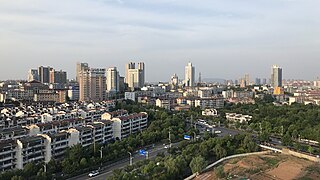
Tongling is a prefecture-level city in southern Anhui province. A river port along the Yangtze River, Tongling borders Wuhu to the east, Chizhou to the southwest and Anqing to the west.

Liyang is a county-level city under the administration of Changzhou in the Jiangsu province of the People's Republic of China. In 2011, it had a population of about 781,500. It borders the prefecture-level divisions of Wuxi to the east, Xuancheng (Anhui) to the south, and Nanjing to the west.
Princess Taiping was a princess of the Chinese dynasty Tang Dynasty and her mother Wu Zetian's Zhou Dynasty. She was the youngest daughter of Wu Zetian and Emperor Gaozong and was powerful during the reigns of her mother and her elder brothers Emperor Zhongzong and Emperor Ruizong, particularly during Emperor Ruizong's second reign.
Wei Dingguo is a fictional character in Water Margin, one of the Four Great Classical Novels in Chinese literature. Nicknamed "General of Holy Fire", he ranks 45th among the 108 Stars of Destiny and 9th among the 72 Earthly Fiends.
Shan Tinggui is a fictional character in Water Margin, one of the Four Great Classical Novels in Chinese literature. Nicknamed "General of Sacred Water", he ranks 44th among the 108 Stars of Destiny and 8th among the 72 Earthly Fiends.
Xuanzhou District is an urban district of the city of Xuancheng, Anhui Province, People's Republic of China. It has a population of 840,000 and an area of 2,533 km2 (978 sq mi).

Guangde County is a county in the southeast of Anhui Province, People's Republic of China, bordering the provinces of Jiangsu to the north and Zhejiang to the east. It is the easternmost county-level division of Anhui and is under the jurisdiction of the prefecture-level city of Xuancheng. The county has a population of 510,000 and an area of 2,165 km2 (836 sq mi). The seat of government is at Taozhou Town.
Wu Jing was a military general who lived during the late Eastern Han dynasty of China. He was a brother-in-law of the minor warlord Sun Jian, whose descendants became the royal family of the state of Eastern Wu in the Three Kingdoms period.
Zu Geng (祖庚) was king of the Shang dynasty of China. His given name was Yue (躍).(According to one source, it was Yao [曜].)
Wu Youji (武攸暨), formally Prince Zhongjian of Ding (定忠簡王), was an imperial prince of Wu Zetian's Zhou Dynasty and an official of Tang Dynasty. He is best known as the second husband of Wu Zetian's powerful daughter Princess Taiping.
Xuan writing brush or Xuanbi, is a type of ink brush made in Anhui Province, China. Xuan brushes are often mentioned together with the famous Xuan paper - a kind of writing paper (rice-paper).
Nanjing dialect, also known as Nankinese, or Nanjing Mandarin, is a dialect spoken in Nanjing, China. It is part of the Jianghuai group of Chinese varieties.
Xikou (disambiguation) may refer to several towns in China:
Chengjiang may refer to the following locations in the People's Republic of China:
Old Guangde dialect is a Northern Wu dialect spoken in southeastern Anhui province in southeastern Guangde county, it is now losing ground to New Guangde dialect, a Jianghuai Mandarin dialect. It is closely related to Shanghainese and Suzhou dialect, but its closest relative is Huzhou dialect. It is a Northern Wu dialect exclave surrounded by speakers of Jianghuai Mandarin and Xuanzhou Wu.

The Jing Ting Mountain, with the ancient name of Zhao Ting Mountain, is in the northern suburbs of Xuancheng City, Anhui province, China.






